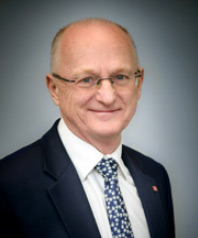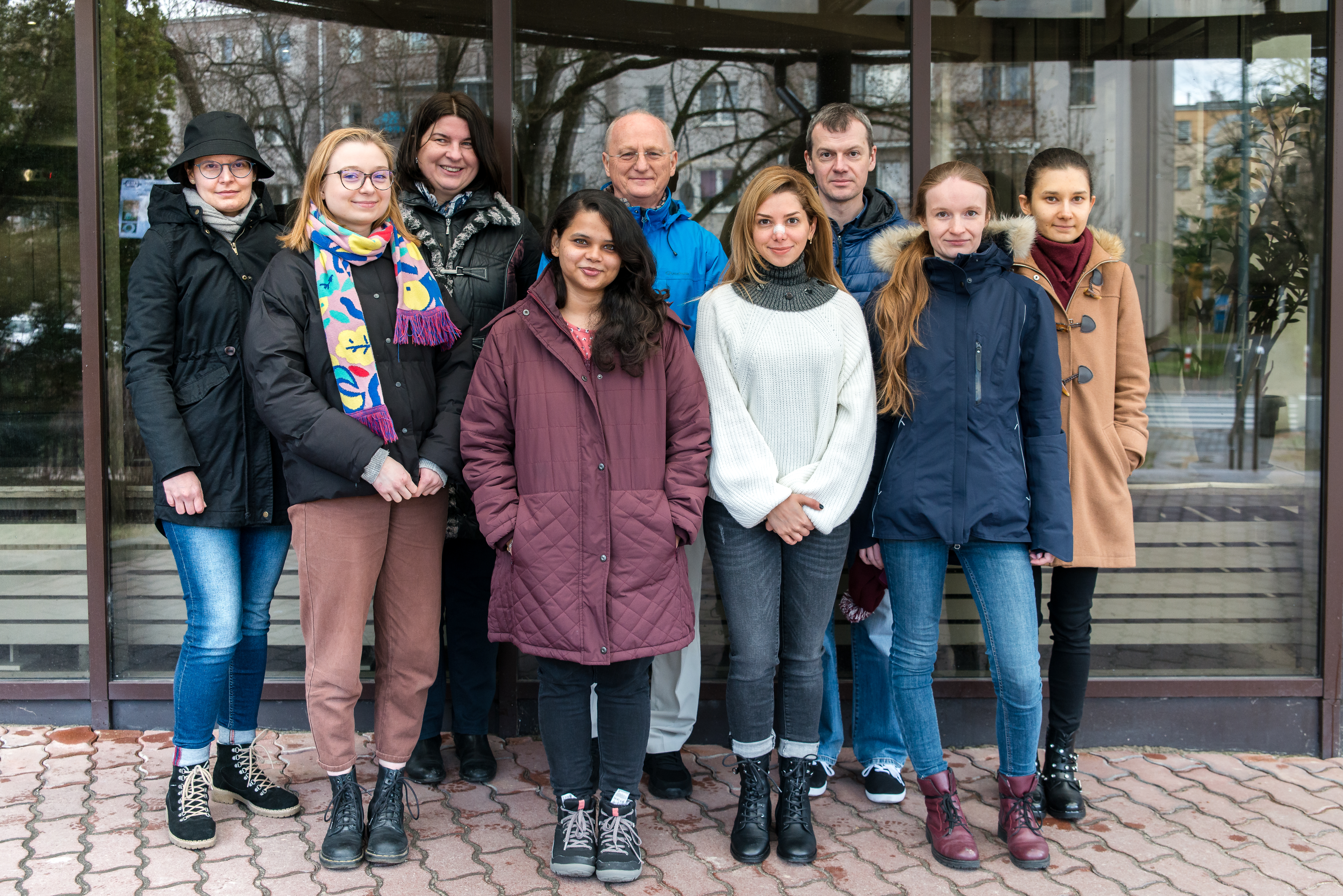We study molecular processes, which degenerate neurons in Alzheimer’s (AD), Parkinson’s (PD) and Huntington’s (HD) diseases. We use cultured human and animal cells as well as fish and mouse models of these diseases. Recently we have shown that the disappearance of neurons in the PD zebrafish model can be stopped by inhibiting the influx of calcium ions to mitochondria. We plan to identify calcium sensitive proteins that take part in the development of this disease.
Research Summary
Parkinson disease (PD) is an incurable neurodegenerative disorder. Its pathological hallmarks include the aggregation of α-synuclein and loss of dopaminergic neurons. In various PD animal models and in cells from PD patients, perturbations of calcium homeostasis occur. Our major focus are on Ca2+ dependent mechanisms involved in the development of PD. Its three types can be distinguished: most prevalent sporadic with a late onset, familial that is caused by mutations of genes such as PINK1 or LRRK2, and environmentally-induced by drugs such as MPTP. Our published data show that degeneration of dopaminergic neurons in zebrafish PD models as a result of a pink1 mutation or MPTP toxicity is rescued by inactivation of the mitochondrial calcium uniporter (MCU). Others showed that MCU inhibition rescues neurons with mutation in LRRK2. If different factors that cause PD have a common denominator that is related to MCU activity, then what is it? Our hypothesis is that specific genes are turned on or off when MCU inactivation exhibits protection of dopaminergic neurons. The aim of our work is to identify those genes, proteins and cells in which they are expressed to understand how they provide neuronal protection.
Scientific Impact
- We expect to identify genes that are turned on or off when calcium ions cannot enter mitochondria via uniporter.
- We will identify cells in which proteins that are encoded by these genes operate.
- The identified genes and proteins might have potential diagnostic value for pre-symptomatic stages of PD and provide a basis for novel anti-PD treatments.
Future Goals
After identifying gene(s) that are turned on or off when calcium ions cannot enter mitochondria via their uniporter and cells in which it takes place to preserve neuronal protection, the goal will be to confirm this mechanism in animal models such as zebrafish.
Comment
"In various animal models of Parkinson’s (PD), as well as of Alzheimer’s (AD) and Huntington’s (HD) diseases and in cells from PD, AD and HD patients, perturbations of calcium homeostasis occur. Studying these processes may identify common pathological mechanism in neurodegenerative diseases", says Prof. Jacek Kuźnicki.

Graphical abstract of project hypothesis to explain how inactivation of mitochondrial calcium uniporter protects dopaminergic neurons. Illustration by Dr. Ewelina Latoszek
 |
Jacek Kuźnicki, PhD, Professor
Correspondence address:
Laboratory of Neurodegeneration
International Institute of Molecular and Cell Biology
4 Ks. Trojdena Street, 02-109 Warsaw, Poland
Email: This email address is being protected from spambots. You need JavaScript enabled to view it.
|
DEGREES
1993 - Professor, awarded by the President of the Republic of Poland
1987 - DSc. Habil., Nencki Institute of Experimental Biology PAS, Warsaw, Poland
1980 - PhD in biochemistry, Nencki Institute of Experimental Biology PAS, Warsaw, Poland
1976 - MSc in biochemistry, Faculty of Biology, University of Warsaw, Poland
PROFESSIONAL EXPERIENCE
2001-present - Professor, Head of Laboratory of Neurodegeneration, International Institute of Molecular and Cell Biology in Warsaw, Poland
2020-2022 - President of the National Science Centre Council, member 2018-2022
2001-2018 - Director, International Institute of Molecular and Cell Biology in Warsaw, Poland; Feb-Dec 2018 Acting Director, International Institute of Molecular and Cell Biology in Warsaw, Poland
2017-2018 - Deputy Chair of the Council of Provosts, 2nd Division: Biological and Agricultural Sciences, Polish Academy of Sciences
2000-2001 - Director, Centre of Excellence Phare Sci-Tech II, Nencki Institute of Experimental Biology, Polish Academy of Sciences, Warsaw, Poland
1999-2001 - Acting Director, International Institute of Molecular and Cell Biology in Warsaw, Poland; Organizer and Director, Centenarian Program
1996-2002 - Head, Laboratory of Calcium Binding Proteins, professor 2002- 2014 Nencki Institute of Experimental Biology, Polish Academy of Sciences, Warsaw, Poland
1992-1995 - Visiting Professor, NIMH, Bethesda, MD, USA
1991-1992 - Deputy Scientific Director, Nencki Institute of Experimental Biology, Polish Academy of Sciences, Warsaw, Poland
1986-1992 - Associate Professor and Head of Laboratory of Calcium Binding Proteins, Nencki Institute of Experimental Biology, Polish Academy of Sciences, Warsaw, Poland
1984-1985 - Research Associate, Nencki Institute of Experimental Biology, Polish Academy of Sciences, Warsaw, Poland
1981-1984 - Visiting Fellow, NIH, Bethesda, MD, USA
1980-1981 - Post-doctoral Fellow, Nencki Institute
1976-1980 - PhD Student, Nencki Institute of Experimental Biology PAN, Warsaw
PROFESSIONAL TRAINING
2018, July - Visiting Professor, Laboratory of H. Burgess, National Institute of Child Health and Human Development, Bethesda, MD, USA
2015, July - Visiting Professor, Laboratory of W. Harris, University of Cambridge, UK
2014, July - Visiting Professor, Laboratory of B.E. Snaar-Jagalska, Leiden University, The Netherlands
1992-1995 - Visiting Professor, Laboratory of D. Jacobowitz, National Institute of Mental Health, Bethesda, MD, USA
1981-1984 - Visiting Fellow (postdoc), Laboratory of E.D. Korn, National Institute of Heart, Lung and Blood, Bethesda, MD, USA
MEMBERSHIP IN SCIENTIFIC SOCIETIES, ORGANIZATIONS, AND PANELS
2020-present - External expert in biotechnology, Łukasiewcz Research Network - PORT Polish Center for Technology Development
2020-present - Ordinary Member, Polish Academy of Sciences
2016-2021 - Member, International Advisory Board, Małopolska Centre of Biotechnology, Jagiellonian University
2011-present - Member, International Expert Council of the Research and Education Center, State Key Laboratory of Molecular and Cellular Biology, Ukraine
2011-2014 - Member, Science Policy Committee, and Rotating President (Jul-Dec 2012), Ministry of Science and Higher Education
2008-2022 - Board Member, European Calcium Society, member since 1997
2008-2018 - Member, Board of Directors, and Rotating President (Jul-Dec 2016, Jul-Dec 2013, Jul-Dec 2010), Biocentrum-Ochota Consortium
2006-2011 - Member, Advisory Group, 7FP HEALTH, European Commission
2004-2019 - Corresponding Member, Polish Academy of Sciences
2004-present - Honorary Chair and co-founder, BioEducation Foundation
2002-present - Head of Program Board, Centre for Innovative Bioscience Education
1993-2014 - Member, Scientific Council, Nencki Institute of Experimental Biology, Polish Academy of Sciences
1996-1998 & 2000-2002 - Vice-President, Biotechnology Committee, Polish Academy of Sciences
1989 - 1991 - General Secretary, Polish Biochemical Society, member since 1977
HONORS, PRIZES AND AWARDS
2018 - Commemorative medal for the 100th Anniversary of the Nencki Institute for outstanding contribution to the development of this Institute, supporting its activities, shaping the image and building a mutual success
2013 - Crystal Brussels Prize for outstanding achievements in 7th Framework Programme of the European Union for Research and Development
2013 - Award from the 2nd Division of Biological and Agricultural Sciences, Polish Academy of Sciences for series of works on β-catenin
2011 - Konorski Award for the best Polish research work in neurobiology awarded by the Polish Neuroscience Society and Committee on Neurobiology of the PAS
2008 - Officer's Cross of the Order of Polonia Restituta awarded by the President of Poland
2004-2007 - Professorial Subsidy Program Award from Foundation for Polish Science
2003 - Prime Minister Award for the scientific achievements, Warsaw
2001 - Award from the Division of Biological Sciences of the PAS for the work on CaBP
1998 - Knight's Cross of the Order of Polonia Restituta awarded by the President of Poland
1987 - Polish Anatomical Society Award for the article in “Advances in Cell Biology”
1986 - Skarzynski Award from the Polish Biochemical Society for the best review article in “Advances in Biochemistry”
1977 - Mozolowski Award, Polish Biochem. Society for outstanding Polish young biochemist
1977 - Parnas Award from Polish Biochem. Society for the best paper in biochemical research
1976 - MSc, Magna cum laude, University of Warsaw
DOCTORATES DEFENDED UNDER LAB LEADER’S SUPERVISION
A. Filipek, J. Kordowska, U. Wojda, J. Hetman, M. Palczewska, M. Nowotny, K. Billing-Marczak, Ł. Bojarski, W. Michowski, K. Misztal, M. Figiel, K. Honarnejad, A. Jaworska, K. Gazda, F. Maciąg, J. Jędrychowska, I. Wasilewska, RK. Gupta.

Lab Leader
Jacek Kuźnicki, PhD, Professor
Senior Researchers
Magdalena Czeredys, PhD
Vladimir Korzh, PhD, DSc Habil
Łukasz Majewski, PhD
PhD Students
Razieh Amini, MSc
Ruchi Prakash Jain, MSc
Ewelina Latoszek, MSc Eng.
Undergraduate students
Marta Piechota, BSc
Volunteers
Sofiia Baranykova, MSc
Iga Wasilewska, PhD (from Mossakowski Medical Research Institute PAS)
Lab Technician
Monika Matuszczyk (part-time)
Laboratory Support Specialist
Dominika Dubicka-Boroch, MSc




